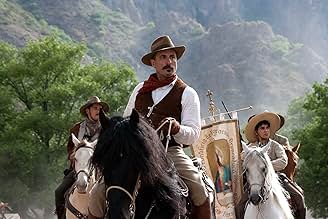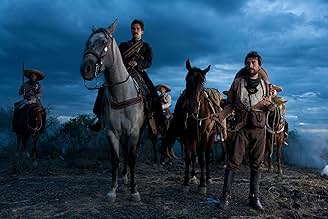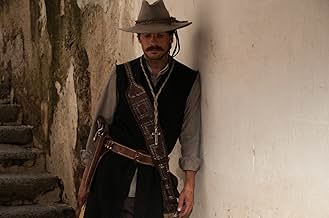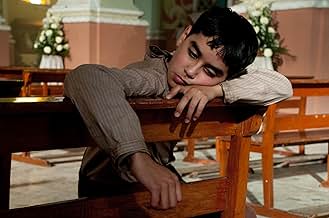CALIFICACIÓN DE IMDb
6.6/10
5.5 k
TU CALIFICACIÓN
Una crónica de la Guerra de los Cristeros (1926-1929); una guerra desatada por el pueblo de México en contra del Gobierno mexicano ateo.Una crónica de la Guerra de los Cristeros (1926-1929); una guerra desatada por el pueblo de México en contra del Gobierno mexicano ateo.Una crónica de la Guerra de los Cristeros (1926-1929); una guerra desatada por el pueblo de México en contra del Gobierno mexicano ateo.
- Premios
- 3 premios ganados y 9 nominaciones en total
Fernanda Urdapilleta
- Sandra Gorostieta
- (as María Fernanda Urdapilleta)
- Dirección
- Guionista
- Todo el elenco y el equipo
- Producción, taquilla y más en IMDbPro
Opiniones destacadas
This is a movie about heroes who stood up for freedom – in this case, religious freedom. It's not easy to make a heroic film, but this movie comes reasonably close. There are a few awkward camera movements, and some of the younger actors don't always make the most convincing performances. However, the overall effort is quite moving and convincing. Considering these events actually happened and these are historical figures not fictional characters makes the movie that much more compelling. Some reviewers have argued that the movie is "too Catholic." Considering these were Catholics fighting, eventually, fighting violently, for their freedoms, these criticisms reveal more about the reviewers' prejudices and biases than it does about the film. This is an important, thought-provoking film about freedom that should be seen and discussed.
"We are now an army, we are an army fighting for Gad and for the church and for absolute freedom." A true story about the Cristeros War (1926-1929) which was a war by the people of Mexico against the atheistic Mexican government led by president Plutarco Elias Calles. Enrique Gorostieta Velarde (Garcia) leads a revolt of Mexican Christians against the government in hopes he can restore Mexico to the faith filled nation it once was. I will start by saying that this is a very good movie and entertaining to watch. I know nothing about the history or how accurate this is but I enjoyed it. The only problem that I had with the movie is that I really felt no connection to any of the characters and when one would get killed or have a serious problem I wasn't invested enough for it to have the impact that it was trying for. That said it doesn't really take away from the enjoyment of the movie but I didn't really feel the emotion that I think the filmmakers were trying for. Garcia is a great choice for this but he seems to play the character he played in "Godfather 3" or the Ocean's movies but a Mexican soldier version and he came off a little too cocky, but like I said I don't know the history and the real guy may have been that way too. It may seem like I'm rambling but the movie was over 2 hours long and it felt it and some parts I found it hard to stay focused on but overall this is a good watch and in my opinion one of the best releases this week. Overall, a good western/war movie that is pretty heavy on the religious issues. I give it a B+.
"For Greater Glory" is an amazing film. It's an inspiring retelling of the the Cristeros War against the Mexican government for its having outlawed the Catholic Church and its executions and massacres of those who dared to live out their religious freedom.
The cast is top-notch and the direction pretty competent, keeping the story weaved among intimate scenes and battle scenes. Filled with poignant moments of the lives of the protagonists and of those close to them and with the heroic - as well as less than heroic - skirmish scenes.
It's a movie about taking sides courageously, how conflicting this can be in a man's conscience, especially when it involves the spilling of blood. If anything, the personal struggle of many characters getting into this war and carrying it out made the film shine. From the young boy who faced martyrdom for the Catholic faith - Jose Sanchez del Rio, beatified in 2005 - to his uncle, a cowardly mayor too enamored of power to save him.
I cannot help thinking how timely this film is when the Church and Catholics - for now - are again being curtailed in their freedoms by a government with its own agenda, this time the American government trying to limit the Church's ministry and to force Catholics to violate their consciences. Like Calles, Obama has presented the same arguments to justify his unjustifiable actions against the Church, Catholics and their institutions. It's government might over faith, the collective over the individual, an usurpation of the state to serve not the people, but an ideology.
PS: disregard most professional critics' reviews for they seem to have a chip on their shoulder so big that it blinds them to the artistic and cinematographic qualities of this film.
The cast is top-notch and the direction pretty competent, keeping the story weaved among intimate scenes and battle scenes. Filled with poignant moments of the lives of the protagonists and of those close to them and with the heroic - as well as less than heroic - skirmish scenes.
It's a movie about taking sides courageously, how conflicting this can be in a man's conscience, especially when it involves the spilling of blood. If anything, the personal struggle of many characters getting into this war and carrying it out made the film shine. From the young boy who faced martyrdom for the Catholic faith - Jose Sanchez del Rio, beatified in 2005 - to his uncle, a cowardly mayor too enamored of power to save him.
I cannot help thinking how timely this film is when the Church and Catholics - for now - are again being curtailed in their freedoms by a government with its own agenda, this time the American government trying to limit the Church's ministry and to force Catholics to violate their consciences. Like Calles, Obama has presented the same arguments to justify his unjustifiable actions against the Church, Catholics and their institutions. It's government might over faith, the collective over the individual, an usurpation of the state to serve not the people, but an ideology.
PS: disregard most professional critics' reviews for they seem to have a chip on their shoulder so big that it blinds them to the artistic and cinematographic qualities of this film.
I just saw For Greater Glory today, and I took away from it an enormous respect for the Catholic faith of the Mexican people. It was a riveting story that I knew nothing about. The young actor who played Jose stole the show, with Father Vega taking a very close second. Definitely worth the time and money to see this movie. It also helped me understand why people defend the right of religious freedom so ferociously in our country when they feel it is being infringed upon by our government. I loved the musical score, and the cinematography - the costumes, the sets, all were excellent. I agree with some other reviews that there were a few things that could have been trimmed in the edit room - I feel we could have lost all the scenes with the US Ambassador without missing much. I hope you go see this movie.
The film hijacks a complex social conflict and turns it into a David and Goliath story of good guys versus bad. In so doing, it whitewashes the historically reactionary role of the Catholic Church in Mexico. One cannot imagine how such an approach would convince or educate any viewer, including those not at all familiar with the history of this conflict. As befits a one-dimensional propaganda film, the performances are mostly flat and cartoonish.
It is ironic that a movie that purports to represent a popular struggle in defense of religion pointedly ignores the main protagonists: the peasants themselves, both as individuals and in their collective action. Throughout the movie, neither the peasant forces, nor the government soldiers that are sent against them are ever depicted as real human beings.
This movie's celebration of faith and charisma—reduced to the cry 'Long Live Christ the King!'—is a crude effort to obscure the underlying class conflicts that gave rise to the real Cristeros, a social movement that is not widely understood .... Victorious in the Mexican Revolution, the Constitutionalist Army, led by Venustiano Carranza, Álvaro Obregón and Calles, had defeated the peasant armies of Pancho Villa and Emiliano Zapata. The new regime was incapable of resolving a central issue over which the Revolution had been fought, the redistribution of land.
The slow and erratic pace of land distribution under Carranza, Obregón and Calles confirmed to the peasantry the military government's timidity in confronting the large and powerful landowners. The immense properties of the church constituted an important source of economic stagnation and social instability. Efforts in the 19th century to force the church to rent out its land to others, let alone to surrender ownership, met with fierce opposition.
According to historian Jesús Silva Herzog the peasantry and the working class confronted a "demonic triumvirate:" the great landowners, the military, and the Church. "Three tragic words define Mexican history: haciendas, sacristy and barracks." Lacking a revolutionary party and isolated from the workers, the rebellion of Mexican peasants was hobbled by the Catholic Church. Desperate peasant and Indians threw themselves into battle during the Cristero War ideologically imprisoned by Catholic dogma.
Had the Cristero War merely pitted the government of President Calles against the Catholic establishment, it is unlikely that the unprecedented brutality—the mass repression of peasants, the burning and looting of their towns—would have taken place. Historically, ruling classes reserve this kind of gross brutality to the rebellion of the most oppressed: peasants, workers or slaves.
It is ironic that a movie that purports to represent a popular struggle in defense of religion pointedly ignores the main protagonists: the peasants themselves, both as individuals and in their collective action. Throughout the movie, neither the peasant forces, nor the government soldiers that are sent against them are ever depicted as real human beings.
This movie's celebration of faith and charisma—reduced to the cry 'Long Live Christ the King!'—is a crude effort to obscure the underlying class conflicts that gave rise to the real Cristeros, a social movement that is not widely understood .... Victorious in the Mexican Revolution, the Constitutionalist Army, led by Venustiano Carranza, Álvaro Obregón and Calles, had defeated the peasant armies of Pancho Villa and Emiliano Zapata. The new regime was incapable of resolving a central issue over which the Revolution had been fought, the redistribution of land.
The slow and erratic pace of land distribution under Carranza, Obregón and Calles confirmed to the peasantry the military government's timidity in confronting the large and powerful landowners. The immense properties of the church constituted an important source of economic stagnation and social instability. Efforts in the 19th century to force the church to rent out its land to others, let alone to surrender ownership, met with fierce opposition.
According to historian Jesús Silva Herzog the peasantry and the working class confronted a "demonic triumvirate:" the great landowners, the military, and the Church. "Three tragic words define Mexican history: haciendas, sacristy and barracks." Lacking a revolutionary party and isolated from the workers, the rebellion of Mexican peasants was hobbled by the Catholic Church. Desperate peasant and Indians threw themselves into battle during the Cristero War ideologically imprisoned by Catholic dogma.
Had the Cristero War merely pitted the government of President Calles against the Catholic establishment, it is unlikely that the unprecedented brutality—the mass repression of peasants, the burning and looting of their towns—would have taken place. Historically, ruling classes reserve this kind of gross brutality to the rebellion of the most oppressed: peasants, workers or slaves.
¿Sabías que…?
- TriviaPartially financed by the Knights of Columbus, whose members in both the United States and Mexico were an integral part of the actual Cristeros Rebellion.
- ErroresJose gives up his white horse to another christero during a battle and hides in the rocks. When the other christero comes back to look for Jose, he is on a brown horse.
- Citas
Father Christopher: Who are you if you don't stand up for what you believe? There is no greater glory than to give your life for Christ.
- Créditos curiososNear the end of the credits, "Batman" is credited as a painter.
- ConexionesFeatured in The Secret Masonic Victory of World War Two (2022)
Selecciones populares
Inicia sesión para calificar y agrega a la lista de videos para obtener recomendaciones personalizadas
- How long is For Greater Glory: The True Story of Cristiada?Con tecnología de Alexa
Detalles
- Fecha de lanzamiento
- País de origen
- Sitio oficial
- Idiomas
- También se conoce como
- For Greater Glory
- Locaciones de filmación
- Productoras
- Ver más créditos de la compañía en IMDbPro
Taquilla
- Presupuesto
- USD 12,000,000 (estimado)
- Total en EE. UU. y Canadá
- USD 5,672,846
- Fin de semana de estreno en EE. UU. y Canadá
- USD 1,885,608
- 3 jun 2012
- Total a nivel mundial
- USD 10,173,682
- Tiempo de ejecución2 horas 25 minutos
- Color
- Mezcla de sonido
- Relación de aspecto
- 2.35 : 1
Contribuir a esta página
Sugiere una edición o agrega el contenido que falta

Principales brechas de datos
What is the Brazilian Portuguese language plot outline for Cristiada (2012)?
Responda




































